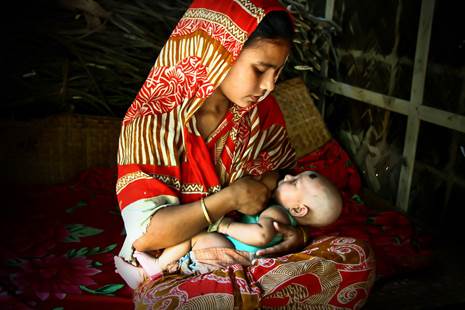Accelerating Progress to End the Inappropriate Promotion of Foods for Infants and Young Children – By HKI’s ARCH Project
It’s been one year since the World Health Assembly (WHA) adopted Resolution 69.9—a call for countries to implement the World Health Organization’s (WHO) Guidance on Ending the Inappropriate Promotion of Foods for Infants and Young Children to further protect breastfeeding, prevent obesity and chronic disease, and promote a healthy diet. Together with the International Code of Marketing of Breast-milk Substitutes (the Code), the guidance safeguards families and caregivers against misleading information that undermines optimal infant and young child feeding practices.
It’s been one year since the World Health Assembly (WHA) adopted Resolution 69.9—a call for countries to implement the World Health Organization’s (WHO) Guidance on Ending the Inappropriate Promotion of Foods for Infants and Young Children to further protect breastfeeding, prevent obesity and chronic disease, and promote a healthy diet. Together with the International Code of Marketing of Breast-milk Substitutes (the Code), the guidance safeguards families and caregivers against misleading information that undermines optimal infant and young child feeding practices.
A tool to protect families
The guidance serves as an important tool to protect families from marketing practices that could be detrimental to their child’s health by:
- Clarifying that “follow-up formula” and “growing-up milks” fall under the scope of the Code and should not be promoted.
- Stating that messages on complementary foods should always include a statement on the need for breastfeeding to continue through two years and that complementary foods should not be fed before six months.
- Saying that labels and designs on complementary foods need to be distinct from those used on breastmilk substitutes to avoid cross-promotion.
- Recognizing that any donations to the health care system (including health workers and professional associations) from companies marketing BMS and foods for infants and young children represent a conflict of interest and should not be allowed.
- Emphasizing that sponsorship of meetings of health professionals and scientific meetings by companies selling BMS and foods for infants and young children should not be allowed.
Adoption of the recommendations
The resolution requires member states to report out on their efforts to implement the guidance at the seventy-first World Health Assembly in 2018. Several agencies and partners—including Helen Keller International—are working with countries to adopt the recommendations laid out in the guidance into national law. Countries have begun referring to the guidance and updating laws and policies to reflect its recommendations. Here are a few examples:
- Thailand recently passed the ‘Control of Marketing of Infant and Young Child Food Act,’ which regulates the “extensive and often misleading industry marketing of breastmilk substitutes.” [2] The act prohibits marketing and advertising of BMS for up to 12 months, and only permits supervised promotions, in compliance with the National Committee in Controlling Breastmilk Substitute Marketing, for 12 to 36 months.
- Indonesia is conducting a review and revising its ‘Food Label & Advertising Regulation.’ The draft is expected to increase the age of BMS advertising from the current scope of only 12 months of age, and incorporate other recommendations from the guidance.
- In Senegal, an Ad Hoc Committee set up by the Health General Director, to Revise the Inter-Ministerial Decree on Marketing of Breastmilk Substitutes is in the process of submitting a developed decree on Marketing of Infant and Young Children Foods. The decree incorporates Code provisions as well as recommendations from the WHO guidance.
Strengthening implementation of the code
Many more countries are actively working to strengthen the implementation of the International Code of Marketing of Breast-milk Substitutes within their national context. But with only one year to go before Member States must report on their progress to the World Health Assembly, countries must accelerate action to adopt the new guidance into national law, establish a system for monitoring and enforcement, and continue to strengthen the protection of breastfeeding and prevent the inappropriate promotion of foods for infants and young children.
Useful resources
Resources are available for countries working to strengthen their national legislation in line with global recommendations. These include:
- Policy Brief on the WHO Guidance on the Inappropriate Promotion of Foods for Infants and Young Children
- Protecting Breastfeeding to 24 Months and Beyond
Failing to take action will put mothers and children at risk, and undermine progress towards improving child nutrition and health around the world.
This blog, by Helen Keller International’s (HKI) Assessment & Research on Child Feeding (ARCH) project, reflects on the WHO Guidance as the 2017 World Breastfeeding Week approaches in coming days. In this regard, HKI’s ARCH Project is partnering with the SUN Civil Society Network to hold a series of three webinars to bring the global community up to speed on current global regulatory and policy issues related to infant and young child feeding.
- WEBINAR 1: THE CODE 1st August 9am GMT/ 3rd August 3pm GMT
- WEBINAR 2: FOLLOW-UP FORMULA 8th August 9am GMT/ 10th August 3pm GMT
- WEBINAR 3: COMPLEMENTARY FOODS 15th August 9am GMT/17th August 3pm GM
For further information please contact the SUN CSN at sun.csnetwork@savethechildren.org.uk’

